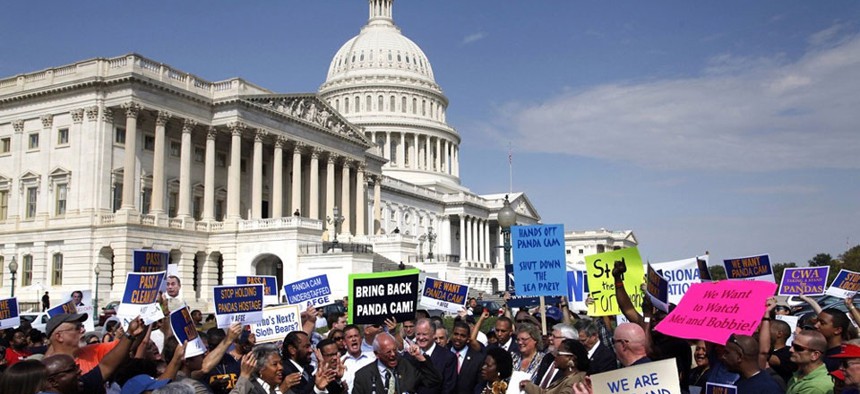
Protesters gathered at the Capitol Sunday to demonstrate against the shutdown. Flickr user minniebloomette
Backlogs and Worries Grow Among Furloughed Federal Workers
From SSA to NSF, employees are antsy to get back on the job.
The government shutdown that is now into its second week is affecting hundreds of thousands of federal employees around the country. While the work stoppage continues, National Journal Daily is asking some of those public servants to share stories of what they and all Americans are missing without their government at full strength.
Social Insecurity
Social Security checks are still going out, but woe to those who are appealing denials of their disability payments, said Elisa Wayne, a lawyer with the Social Security Administration’s Office of Disability Adjudication and Review in downtown Los Angeles.
“The cases will be heard, but the vast majority of them won’t be processed,” Wayne said. “They’re calling the judges essential, but none of the case technicians, the attorneys, like me, or the people who do the mailings are essential, so there’s no one to write up the cases and move them along.”
As a result, Wayne anticipates she’ll be buried under a mountain of work when the shutdown eventually ends. “It just kind of puts us back at square one,” she said, adding, “Congress is always asking us to get the backlog of cases down, and now it’s just going to keep building up.”
When the shutdown began on Oct. 1, Wayne went to work as usual -- but only for an hour.
“We were told that if the shutdown happened we would have to come in on Tuesday, finish up whatever outstanding work there was, sign some papers and go home,” Wayne said. “We weren’t allowed to work more than four hours that day.”
Wayne described the mood in the office that morning as one of confusion and irritability. “I don’t think people were surprised that the shutdown happened,” she said. “I think they were more frustrated with the reasons for it and the partisan politics that were going on.”
Wayne, 56, is in the Social Security office that handles appeals cases from individuals whose request for disability benefits has been denied. After a judge approves or denies an appeal, Wayne writes up a legal justification for the ruling.
Social Security disability checks will continue to go out during the shutdown, and judges will hear scheduled appeals cases. But if an individual’s appeal is granted, that person has little chance of receiving benefits until the shutdown ends, Wayne said.
She is cautiously optimistic the shutdown will be resolved soon. But she’s worried that if it isn’t, she’ll have trouble paying rent next month. “I’m one of the lucky ones, and I know that,” she said, “but I’m still concerned about my financial obligations.”
More than anything, Wayne is frustrated with the whole situation. “I just think there’s no accountability. There’s no pain and suffering by the members of Congress. They’re still getting paid. For them, it’s work as usual.”
Clare Foran
Cabin Fever
One week into the shutdown, Rebecca Morrison is running out of housework.
Last Tuesday, on her first unscheduled day off from her job as a survey statistician for the National Science Foundation, she returned books to the library and tossed out unwanted DVDs.
“I purged a bunch of things from my house,” she said.
Apart from housekeeping, Morrison and her husband, who works for the Census Bureau, “watched a few things on the DVR” and, above all, scrimped and saved. “We’re trying not to spend too much money.”
The NSF, perhaps in response to widespread grumbling about the “essential” and “nonessential” labels, instead declared its employees either “accepted” or “non-accepted.” This terminology “feels better somehow,” Morrison said, “Although I really wasn’t offended by ‘nonessential,’ since it’s a legal term.”
Notwithstanding the agency’s linguistic gymnastics, the shutdown is a bitter pill for the couple. “We’re not used to hanging around the house,” Morrison said, who lives in Hyattsville. Md. “This is outside the realm of our normal experience.” With their 2-year-old in day care, they have a mild case of cabin fever.
“Both my husband and I have been steady workers in the federal government since we graduated from college,” she said. “To all of a sudden be out of work is incredibly strange to us.”
Yet, the government shutdown was not entirely unexpected. “It felt somewhat inevitable to me,” Morrison said. “In previous threats of a shutdown, there was some kind of high-level negotiations happening.... But this time around, it felt like a foregone conclusion.”
Morrison, 37, was raised in Fairfax County, Va. After graduating from Mary Baldwin College in Staunton, Va., she spent 14 years rotating though various offices at the Census Bureau.
As the daughter of a Pentagon worker, her public service was in some sense preordained. “When I was coming out of college, it was really important for me to consider being a federal worker, and that’s pretty much the only career path that I fully engaged with, although I did go through some intellectual exercises associated with going into private industry.”
Morrison arrived at the Science Foundation in February.
Christopher Snow Hopkins
(Image via Flickr user republicanconference)
NEXT STORY: 7 Ways to Improve Your Mood at Work






